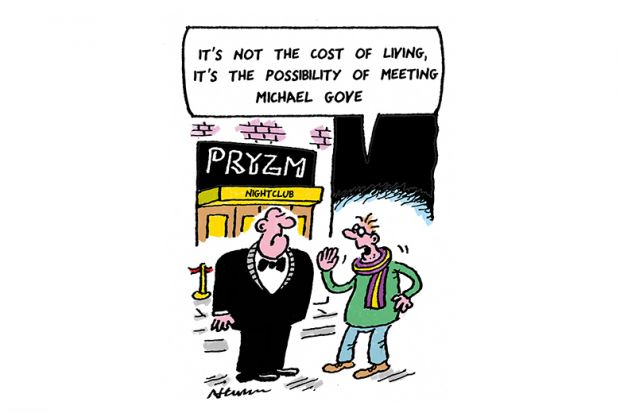
Have students lost their lust for long nights of clubbing and long mornings of attempting not to throw up in the lecture theatre? The boss of the UK’s biggest club owner, Rekom, believes so: as 17 venues belonging to the Pryzm and Atik chains closed their doors, boss Peter Marks called cost-of-living concerns “singularly the biggest issue that we face”, with students going out later and buying fewer drinks. Chloe Field, vice-president for higher education at the National Union of Students, told the BBC that many students were devoting more time to part- or full-time jobs, preventing them from going out at all, while Save the Student’s Tom Allingham said research indicated young people were drinking less even before the cost-of-living crisis. Could a once elusive event become commonplace: a 9am lecture without at least one student falling asleep?
Imperial College London’s newly unveiled logo, part of the university’s rebranding project, has gone down so badly that a petition against it collected more than 3,000 signatures within just a few days of the launch. The logo, which omits most of the institution’s name to simply read “Imperial” in bold blue all-caps, has been condemned for emphasising the legacy of empire. “Several members are concerned with the pejorative historical connotations associated with this word,” a spokesperson for the local University and College Union (UCU) branch said. Others questioned the removal of the UK capital, a key selling point of the university, from the logo. Defending the redesign, an Imperial spokesperson said: “We have developed the brand identity with ideas and feedback from thousands of students, staff and alumni – testament to our community’s ambition, creativity, diversity and commitment to Imperial’s future.”
Young American athletes often devote large swathes of their teenage years to securing coveted college scholarships, whether they’re football or basketball players, gymnasts or rowers. At one South Carolina University, the roster has just widened to include a heretofore-unrepresented sport: cornhole, in which players compete to launch bean bags through a hole in an angled board. Winthrop University recently announced it had awarded scholarships to two teenage cornhole talents, Gavin Hamann and Jaxson Remmick, in the hope that they would lead the Winthrop University Eagles to glory in the American Cornhole League. What would fans tell the sceptics who question why it should be considered a sport? “The same thing goes for when baseball started. I mean, somebody picked up a stick, probably a broomstick, I don’t know, maybe hit a rock and look what they turned it into,” Eagles coach Dusty Thompson told NPR.
In news that might surprise every University of Cambridge student who isn’t a privately educated white boy yet spends much of their undergraduate years in their presence, the institution is allegedly discriminating against privately educated white boys – or so says the vice-chancellor of the University of Buckingham, James Tooley, who has hired former Birkbeck, University of London professor Eric Kaufmann to lead a Centre of Heterodox Social Science. Speaking ahead of Professor Kaufmann’s impending course on “woke ideology”, Professor Tooley told The Times that, by “increasing the number of ethnic minority males and females, and females in general”, Cambridge was “absolutely being discriminatory against the privately educated, particularly privately educated white males”. In less surprising news, Professor Tooley named the inspiration for Buckingham’s new centre, whom he said he felt “at his shoulder”: Margaret Thatcher.
Former US president and current presidential candidate Donald Trump hasn’t had the most success in the higher education field: his own institution, Trump University, was the subject of multiple class action lawsuits ending in a $25 million (£19.7 million) settlement, with lawyers noting that the real estate seminar company was not, in fact, an accredited university. Perhaps he’ll take solace in another update from academia: the latest instalment of the Presidential Greatness Project, which surveys scholars on whom they consider the nation’s greatest president, found that Mr Trump was the only recent Republican president not to drop down in the rankings. George W. Bush, George H.W. Bush and Ronald Reagan all lost ground between the 2018 and 2024 surveys, conducted by Brandon Rottinghaus and Justin Vaughn, political science professors from the University of Houston and Coastal Carolina University. Mr Trump, on the other hand, maintained his position: in both rankings, he came in dead last.